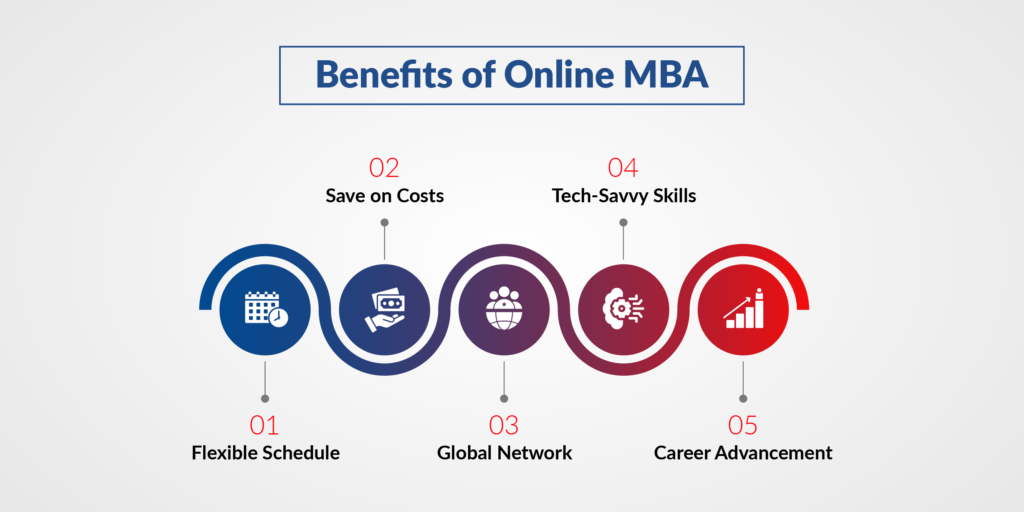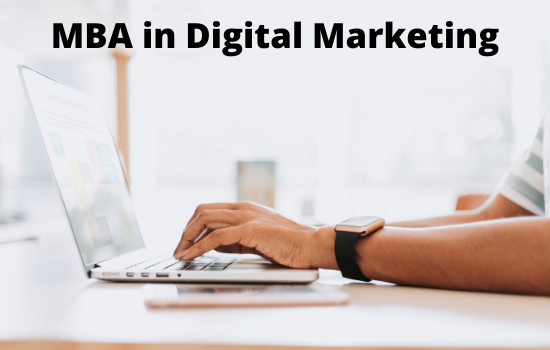Marketing is at the heart of business growth, customer engagement, and brand reputation. In an increasingly digital and global marketplace, companies need innovative marketers who understand consumer behavior, data analytics, branding, and strategic communication. An Online MBA in Marketing provides working professionals, entrepreneurs, and aspiring leaders the flexibility to deepen their knowledge without pausing their careers.
Online MBA programs in marketing offer a unique blend of academic rigor, real-world application, and technological adaptability, enabling students to stay ahead in a rapidly evolving business world.
Key Takeaways
- Flexibility and Convenience
Study from anywhere, on your schedule—ideal for working professionals or those balancing family commitments. - Career Advancement
Gain credentials and strategic marketing knowledge that can lead to promotions, leadership roles, or career shifts. - Specialized Skill Development
Learn in-demand skills like digital marketing, branding, data analytics, and consumer behavior. - Networking Opportunities
Connect with peers, faculty, and industry professionals through virtual events, discussion boards, and alumni networks. - Cost-Effectiveness
Often more affordable than traditional on-campus programs, with potential savings on commuting and housing. - Global Perspective
Collaborate with diverse classmates from different regions and industries, broadening your business worldview. - Immediate Application
Apply what you learn in real time to your current job, reinforcing concepts and boosting on-the-job performance.
What Is an Online MBA in Marketing?
An Online MBA in Marketing is a graduate-level degree program focused on developing advanced knowledge in marketing, business management, and strategic decision-making. It is offered through virtual platforms, allowing students to study at their own pace from anywhere in the world.
These programs are designed for:
- Working professionals seeking career advancement
- Entrepreneurs looking to scale their businesses
- Career changers transitioning into marketing roles
- Global learners who prefer the flexibility of online education
Core Curriculum Components
An Online MBA in Marketing typically includes a mix of foundational business subjects and specialized marketing topics such as:
- Marketing Strategy
- Consumer Behavior
- Digital Marketing
- Brand Management
- Data Analytics
- Sales & Distribution
- Market Research
- International Marketing
- E-commerce and Social Media
Students also gain exposure to real-world case studies, simulations, group projects, and sometimes even virtual internships or capstone projects.
Key Benefits of an Online MBA in Marketing

Let’s explore the key advantages in depth:
Flexibility and Convenience
Online MBAs are designed to be flexible, accommodating learners with jobs, families, or travel schedules.
- Self-Paced Learning: Many programs offer asynchronous learning, allowing students to complete lectures and assignments anytime.
- Work-Study Balance: Professionals can immediately apply what they learn at work.
- Geographic Independence: You can study from anywhere—urban cities or remote towns.
This flexibility is one of the strongest motivators for professionals pursuing an online MBA.
Cost-Effectiveness
Pursuing an MBA online can be more affordable than on-campus programs:
- Lower Tuition Fees: Online programs typically cost 20–40% less than in-person equivalents.
- No Relocation or Commute Costs: Save on transportation, accommodation, and moving expenses.
- Continued Income: Students can keep earning while studying, reducing the overall financial burden.
Some institutions also offer installment payment plans, financial aid, and employer sponsorships.
Real-Time Career Advancement
Unlike traditional programs that require time off, an Online MBA lets you grow while you work:
- Promotions: Gain skills that qualify you for managerial roles during the program.
- Increased Salary Potential: MBA graduates often see salary increases ranging from 30% to 60% after graduation.
- Job Change or Transition: The degree gives you credibility to switch to marketing from other sectors.
You can immediately apply new knowledge to real work scenarios—boosting your value in the eyes of employers.
Specialized Knowledge in Modern Marketing

Marketing is evolving rapidly, and so are MBA programs:
- Digital Marketing: Learn SEO, SEM, social media, and email marketing tools like Google Analytics, Meta Ads Manager, and HubSpot.
- Data-Driven Strategy: Understand customer insights through data visualization and predictive modeling.
- Global Branding: Study how global markets operate and how brands compete internationally.
- Content Marketing & Storytelling: Create compelling brand narratives that drive engagement.
This specialization prepares you for industries including tech, retail, media, healthcare, and more.
Networking & Industry Connections
Even in online settings, networking is powerful:
- Virtual Events & Webinars: Interact with alumni, guest speakers, and industry leaders.
- Group Projects: Collaborate with peers from various industries and countries.
- LinkedIn Integration: Institutions often organize events where students can connect directly on LinkedIn and other platforms.
Many programs offer career counseling, resume writing workshops, and mock interviews.
Technology-Driven Learning
Online MBA students gain digital fluency essential in today’s work environment:
- Virtual Collaboration Tools: Master Zoom, Slack, Trello, and other platforms.
- Simulations & Real-Time Analytics: Use CRM systems, market simulations, and AI-driven dashboards.
- Online Presentations: Learn to pitch and present ideas remotely—a vital skill in hybrid workplaces.
These skills aren’t just academic—they’re critical in remote, global teams.
Career Paths & Global Mobility
An MBA in Marketing opens doors in diverse sectors:
- Marketing Manager
- Digital Marketing Specialist
- Brand Manager
- Market Research Analyst
- Product Marketing Manager
- Sales Director
- Chief Marketing Officer (CMO)
You can work across various industries like finance, FMCG, healthcare, entertainment, and e-commerce. Many professionals also go on to become consultants or start their own agencies or businesses.
Specializations Within Online MBA in Marketing
| Specialization | Description | Key Topics Covered |
|---|---|---|
| Digital Marketing | Focuses on online platforms to promote brands and drive engagement | SEO, SEM, social media marketing, email campaigns, web analytics, PPC advertising |
| Brand Management | Teaches how to build, manage, and protect brand identity and value | Brand positioning, customer perception, brand equity, storytelling, brand lifecycle |
| Consumer Behavior | Analyzes how consumers think, feel, and make buying decisions | Psychology of buying, market segmentation, cultural behavior, behavioral economics |
| Marketing Analytics | Emphasizes data-driven decision-making in marketing | Predictive analytics, CRM, data visualization, metrics and KPIs, data interpretation |
| International Marketing | Prepares students to market products globally and handle cultural differences | Global market entry, cross-cultural communication, trade laws, global branding |
| Product Marketing | Focuses on launching and positioning products in the market | Go-to-market strategies, product lifecycle, positioning, customer value propositions |
| Content Marketing | Centers around creating valuable content to attract and retain customers | Content strategy, SEO writing, blogging, video marketing, editorial planning |
| Sales Management | Equips learners with skills to lead sales teams and strategies | Sales forecasting, team leadership, sales funnel optimization, negotiation skills |
| Retail Marketing | Tailored to professionals in e-commerce or physical retail industries | Merchandising, pricing strategy, omnichannel retail, customer experience |
| Strategic Marketing | Focuses on long-term planning and competitive marketing strategy | SWOT analysis, market analysis, strategic frameworks, competitive positioning |
Many programs allow students to specialize further. Here are popular tracks:
Digital Marketing
Focuses on:
- SEO & SEM
- Content Strategy
- Social Media
- Mobile Marketing
- Email Automation
Consumer Psychology
Learn about:
- Emotional triggers in buying
- Market segmentation
- Behavioral economics
International Marketing

Explore
- Global market entry strategies
- Cross-cultural communication
- Regulatory challenges in marketing
Branding & Strategic Communication
Topics include:
- Brand identity and positioning
- Crisis communication
- Public relations and storytelling
Challenges and Considerations
While Online MBA programs offer numerous advantages—flexibility, affordability, and global access—they also come with a unique set of challenges that prospective students should thoughtfully consider. Understanding these factors will help you make a well-informed decision and prepare for a successful learning journey.
Self-Discipline and Time Management Are Essential
One of the biggest challenges of online learning is the lack of structured, in-person supervision. Online MBA programs often feature asynchronous classes and self-paced learning modules, which means you won’t have daily reminders or traditional classroom accountability. This demands a high level of self-motivation, organization, and time management. Students who thrive in such programs are typically those who are proactive in setting goals, creating schedules, and sticking to deadlines without external pressure.
Limited Face-to-Face Networking
One of the perceived drawbacks of online MBA programs is the reduced opportunity for in-person interaction. Unlike on-campus MBAs, where spontaneous hallway conversations or social events can lead to professional connections, online formats rely heavily on virtual tools—video conferencing, chat groups, online forums, and collaborative platforms.
While many top programs (including those from TimesPro, Coursera, or Wharton Online) now offer virtual networking events, career fairs, and alumni meet-ups, the absence of physical presence can sometimes hinder deep relationship-building. This may be a disadvantage for individuals who rely on social dynamics for learning and career growth.
Accreditation and Program Credibility
Not all online MBAs are created equal. With the growing popularity of remote learning, the market has also seen a rise in unaccredited or low-quality programs. Choosing an unrecognized institution may impact the value of your degree in the job market. Employers typically prioritize candidates who graduate from accredited institutions because it assures them of educational quality and curriculum relevance.
Look for accreditations from recognized bodies such as:
- AACSB (Association to Advance Collegiate Schools of Business)
- AMBA (Association of MBAs)
- EQUIS (EFMD Quality Improvement System)
- AICTE/UGC (India-specific bodies)
Technology Dependency and Digital Fatigue
Since Online MBA programs are entirely technology-driven, students need a reliable internet connection, digital devices, and a comfortable learning environment. You may need to familiarize yourself with various platforms such as Zoom, Google Meet, LMS portals, collaboration tools (like Slack or Microsoft Teams), and digital libraries.
Furthermore, extended screen time—often up to several hours per day—can lead to digital fatigue, eye strain, and reduced concentration. This is especially challenging for those already spending their workdays in front of a computer.
Limited Hands-On Learning or Experiential Exposure
Certain aspects of traditional MBA programs—like real-time internships, industry visits, on-campus consulting labs, or business simulations—may be limited or adapted in an online format. While many top programs are introducing virtual internships and simulations, they may not fully replicate the hands-on experience of a physical business environment.
Perception Gap in Some Industries
Despite growing recognition, some traditional employers or industries (particularly in finance, consulting, or government sectors) may still favor traditional MBA programs from renowned on-campus institutions. While this gap is closing, it’s important to assess how your target industry or employer perceives online qualifications.
Work-Life-Study Balance Can Be Challenging
Balancing a full-time job, personal life, and academic responsibilities can lead to burnout or time constraints, especially during peak work periods or exam times. The constant switching of roles—employee, student, and family member—requires emotional and mental resilience.
Advice: Set realistic goals, seek support from your employer or family when needed, and practice self-care to maintain your overall well-being.
Also Read :What Is The Purpose Of An MBA Degree And Why Is It So Valuable?
Conclusion
An Online MBA in Marketing is more than a degree—it’s a launchpad for growth, leadership, and innovation in a digital economy. It blends flexibility with academic excellence, empowering you to lead modern marketing efforts across sectors.
Whether you’re aiming for a promotion, switching careers, or building your own brand, this program arms you with relevant, future-proof skills. And with online learning now mainstream, your degree will carry weight wherever you go.
FAQs
1. Is an Online MBA as valuable as a traditional one?
Yes—if it’s from an accredited, reputable institution, employers prioritize skills and results over how the degree was earned.
2. Can I pursue it while working full-time?
Absolutely. Online MBAs are specifically designed for working professionals with flexible schedules.
3. What is the average salary after graduation?
Graduates typically earn $80,000 to $130,000+ per year, depending on experience, industry, and job role.
4. How long does it take to complete?
Most programs are 18–24 months long, with some offering accelerated options.
5. Are online students eligible for internships?
Yes. Many schools offer virtual internships or partner with companies for real-world marketing projects.
6. Is marketing still in demand?
Definitely. Fields like digital marketing, analytics, and brand strategy are especially sought-after worldwide.
7. What kinds of companies hire marketing MBAs?
Top employers include Google, Amazon, P&G, Deloitte, Salesforce, HubSpot, and a wide range of startups and agencies.


